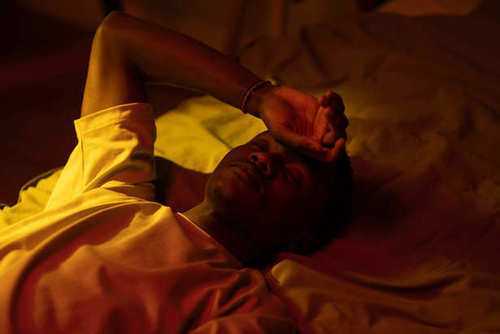
Sleep paralysis happens when you wake up (or fall asleep) and your body stays in the "sleep mode," meaning it can’t move—like you’ve been frozen in place. Your brain is fully awake, but your muscles aren’t quite ready to join the party. This delightful state usually lasts anywhere from a few seconds to a few minutes, and it feels like an eternity. And if you’re lucky enough, your brain decides that this moment of vulnerability is a good time to throw in a weird hallucination or two. Shadows, figures, or the feeling that something's lurking at the foot of your bed—because who doesn’t love an existential crisis at 3 a.m.?
1. Your Brain is Confused

Brain paralysis protects you from acting out dreams.
Let’s start with the basics. When you sleep, your body enters a state of paralysis to keep you from acting out your dreams. This is part of something called REM (Rapid Eye Movement) sleep. The theory is, your brain knows it’s probably a
bad idea to start kicking your partner in the face while you’re dreaming of running through a field of unicorns. So, it paralyzes you, because, apparently, your brain thinks this is an excellent solution. But—plot twist—if you wake up before your brain remembers to un-paralyze you, you’re stuck. Imagine your brain trying to shut down the system for the night and then realizing it’s left you mid-boot. Oops.
2. Stress and Anxiety

Stress and anxiety can trigger more paralysis episodes.
Let’s be honest: life is stressful. You’re juggling work, relationships, possibly even trying to adult. And let’s not forget that thing called “existential dread,” which is more of a
lifestyle than a feeling at this point. High levels of stress and anxiety can make sleep paralysis a more frequent guest at your bedtime festivities. Your stressed-out mind might jump-start your REM cycle too early, or your body might still be in fight-or-flight mode when you wake up. So, yeah, instead of feeling rested and ready to take on the day, you’re laying there like you’re trapped in a low-budget horror flick, starring only you and your overactive imagination.
3. Irregular Sleep Patterns

Irregular sleep patterns mess with REM cycles.
Let’s talk about your sleep schedule—or, as I like to call it, your beautiful disaster. If you’re the type to binge-watch an entire series until 3 a.m. on a work night, sleep paralysis might just be sending you a thank-you note. Lack of sleep, or constantly switching up your sleep routine, can mess with your REM cycles. Your brain doesn’t like this, and guess what? It starts to glitch. And then, of course, you end up staring at the ceiling, mentally screaming, while your body is acting like it’s still in deep sleep. Who knew not getting enough rest could come with such terrifying side effects?
4. Sleep Disorders

Sleep disorders disrupt sleep, increasing paralysis risks.
If you're living with sleep disorders like narcolepsy, insomnia, or sleep apnea, well, your sleep schedule is probably a bit of a mess. And that’s like waving a red flag in front of the sleep paralysis bull. Disrupted sleep cycles can trigger those classic paralysis episodes. So now, on top of not getting enough sleep, you’ve got your body and brain in a battle of wills. But hey, who needs restful sleep when you could have all this extra fun, right?
5. The “Sleep Paralysis Demon” Phenomenon

Misinterpreted paralysis can create hallucinated "demons."
Okay, so this one’s a bit of a stretch. But if you’ve ever Googled "sleep paralysis" (which, by the way, is the
worst thing you can do when you’re already freaked out), you’ve probably come across this myth about "sleep paralysis demons." Some cultures say it’s a supernatural entity that sits on your chest, preventing you from moving or breathing. Science has a more grounded explanation: your brain may be misinterpreting the paralyzed state as a threat. It’s an old survival instinct—think of it as your inner warrior trying to protect you from danger. Except, instead of a saber-toothed tiger, it’s just your own panic. But the brain, in all its glory, decides to throw in a demon for dramatic flair.
6. Genetics

Genetics can make you more prone to Sleep paralysis.
It’s like the cherry on top of the sundae. If sleep paralysis runs in your family, there’s a chance you’ve inherited the fun little trait of waking up and not being able to move. Thanks, Dad. Thanks, Mom. It’s like being handed a gift you didn’t want and can’t return. This happens because some people’s brains are naturally wired to trigger REM sleep more easily or have more intense dreams. And when that happens, well, sleep paralysis can become a regular part of your sleep cycle. But hey, at least you can bond with your relatives over shared horror stories. That’s what family is for, right?
How to Stop Sleep Paralysis in the Moment

Focus on small movements, breathing, and staying calm.
Stopping sleep paralysis in the moment feels like trying to wake up in a horror movie, but it’s possible. First, don’t panic (easier said than done, I know). To stop sleep paralysis instantly, focus on small, actionable steps. Try wiggling your fingers, toes, or even your tongue if everything else feels stuck. Rapid blinking or clenching your fist can also help jolt your body awake. Concentrate on deep, steady breaths to override the panic, and mentally relax each muscle, starting from your feet upward. Shift your gaze around the room, hum or make small noises if you can, and anchor yourself in reality by silently repeating, “This isn’t real.” These simple actions can help break the paralysis and bring you back to full control quickly.
 Sleep paralysis happens when you wake up (or fall asleep) and your body stays in the "sleep mode," meaning it can’t move—like you’ve been frozen in place. Your brain is fully awake, but your muscles aren’t quite ready to join the party. This delightful state usually lasts anywhere from a few seconds to a few minutes, and it feels like an eternity. And if you’re lucky enough, your brain decides that this moment of vulnerability is a good time to throw in a weird hallucination or two. Shadows, figures, or the feeling that something's lurking at the foot of your bed—because who doesn’t love an existential crisis at 3 a.m.?
Sleep paralysis happens when you wake up (or fall asleep) and your body stays in the "sleep mode," meaning it can’t move—like you’ve been frozen in place. Your brain is fully awake, but your muscles aren’t quite ready to join the party. This delightful state usually lasts anywhere from a few seconds to a few minutes, and it feels like an eternity. And if you’re lucky enough, your brain decides that this moment of vulnerability is a good time to throw in a weird hallucination or two. Shadows, figures, or the feeling that something's lurking at the foot of your bed—because who doesn’t love an existential crisis at 3 a.m.?






